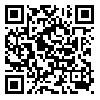Volume 28 - Supplementary
IBJ 2024, 28 - Supplementary: 375-375 |
Back to browse issues page
Download citation:
BibTeX | RIS | EndNote | Medlars | ProCite | Reference Manager | RefWorks
Send citation to:



BibTeX | RIS | EndNote | Medlars | ProCite | Reference Manager | RefWorks
Send citation to:
Mousaei I, Moradi A, Taghipour A, Salari M, Mosafarkhani E. Food Insecurity and Breast Cancer Incidence: An Ecological Study in Razavi Khorasan Province, Iran. IBJ 2024; 28 :375-375
URL: http://ibj.pasteur.ac.ir/article-1-4812-en.html
URL: http://ibj.pasteur.ac.ir/article-1-4812-en.html
Abstract:
Introduction: Food insecurity has emerged as a significant public health concern worldwide, yet its association with breast cancer (BC) incidence remains understudied, particularly in low- and middle-income countries like Iran.
Methods and Materials: This cross-sectional study utilized electronic healthcare data from Mashhad University of Medical Sciences, aggregated at the city level across the population covered by Mashhad University in Iran in 2022. Age-standardized incidence rates of BC in each city served as the primary outcome variable. A multivariable linear regression model was constructed with age-standardized BC incidence rate as the dependent variable and food insecurity, mean age, obesity, diabetes, smoking, and total fertility rate as independent predictor variables.
Results: Higher levels of food insecurity were associated with lower age-standardized BC incidence rates (β = -0.0103; 95% CI: -0.0147, -0.0059; p = 0.001) after adjusting for mean age, obesity, diabetes, smoking prevalence, and total fertility rate. Obesity (β = 0.9460; 95% CI: 0.7312, 1.1608; p = 0.001) and smoking prevalence (β = 0.3899; 95% CI: 0.2751, 0.5047; p = 0.001) were positively associated with BC incidence. However, diabetes prevalence (β = -2.4594; 95% CI: -3.0742, -1.8446; p = 0.001) and total fertility rate (β = -8.5297; 95% CI: -10.6775, -6.3819; p = 0.001) showed inverse associations.
Conclusion and Discussion: This ecological study demonstrated the association of higher levels of food insecurity with lower age-standardized BC incidence rates in Razavi Khorasan province, Iran. These findings highlight the importance of addressing social determinants like food insecurity in cancer prevention and control strategies, particularly in low- and middle-income countries.

Methods and Materials: This cross-sectional study utilized electronic healthcare data from Mashhad University of Medical Sciences, aggregated at the city level across the population covered by Mashhad University in Iran in 2022. Age-standardized incidence rates of BC in each city served as the primary outcome variable. A multivariable linear regression model was constructed with age-standardized BC incidence rate as the dependent variable and food insecurity, mean age, obesity, diabetes, smoking, and total fertility rate as independent predictor variables.
Results: Higher levels of food insecurity were associated with lower age-standardized BC incidence rates (β = -0.0103; 95% CI: -0.0147, -0.0059; p = 0.001) after adjusting for mean age, obesity, diabetes, smoking prevalence, and total fertility rate. Obesity (β = 0.9460; 95% CI: 0.7312, 1.1608; p = 0.001) and smoking prevalence (β = 0.3899; 95% CI: 0.2751, 0.5047; p = 0.001) were positively associated with BC incidence. However, diabetes prevalence (β = -2.4594; 95% CI: -3.0742, -1.8446; p = 0.001) and total fertility rate (β = -8.5297; 95% CI: -10.6775, -6.3819; p = 0.001) showed inverse associations.
Conclusion and Discussion: This ecological study demonstrated the association of higher levels of food insecurity with lower age-standardized BC incidence rates in Razavi Khorasan province, Iran. These findings highlight the importance of addressing social determinants like food insecurity in cancer prevention and control strategies, particularly in low- and middle-income countries.

| Rights and permissions | |
 |
This work is licensed under a Creative Commons Attribution-NonCommercial 4.0 International License. |







.png)
